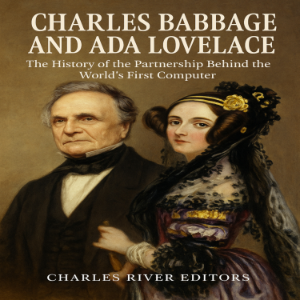

Charles Babbage and Ada Lovelace: The History of the Partnership Behind the World’s First Computer
Charles River Editors
While many are familiar with those facts, and a recent movie revived interest in Alan Turing’s achievements with computing during World War II, it was Charles Babbage who was the first to conceive the notion of a programmable and automatic universal computer, which, on top of its ability to calculate any mathematical equation at an unmatched speed, could also be used for a seemingly infinite number of other applications. In other words, he envisioned the precursor to the modern computer.
At first blush, Babbage hardly seemed the type, because in many ways, Babbage was the antithesis of the debonair, silver-tongued, and effortlessly charismatic CEOs of present-day tech giants. Babbage was a quirky individual to say the least. He was highly observant, but was in the same breath a habitual daydreamer, often caught in a trance of deep thought. Indeed, his unquenchable thirst for knowledge and his brilliant mind were unparalleled, but this was paired with his restless, addictive, and extreme nature, as well as his obsession with precision and factual accuracy.
Working with Babbage was certainly an unusual path for any woman, but Ada Lovelace managed to do so before an incredibly premature death. Augusta Ada King, Countess of Lovelace, died in 1852 at the age of 36, but during her short and tumultuous life, she was one of the first to recognize that computers could do far more than complex calculations. This was all the more surprising given that, during her life, no computers existed, and her ideas were based on an implicit understanding of the theoretical work of Charles Babbage, who himself is today recognized as the “Father of the Computer.” What makes her work truly startling is that she did this more than 100 years before the first computer had even been created. But Ada Lovelace was a woman, and in Victorian England, her work was generally either ignored or disparaged.
Duration - 2h 25m.
Author - Charles River Editors.
Narrator - Victoria Woodson.
Published Date - Thursday, 16 January 2025.
Copyright - © 2025 Charles River Editors ©.
Location:
United States
Description:
While many are familiar with those facts, and a recent movie revived interest in Alan Turing’s achievements with computing during World War II, it was Charles Babbage who was the first to conceive the notion of a programmable and automatic universal computer, which, on top of its ability to calculate any mathematical equation at an unmatched speed, could also be used for a seemingly infinite number of other applications. In other words, he envisioned the precursor to the modern computer. At first blush, Babbage hardly seemed the type, because in many ways, Babbage was the antithesis of the debonair, silver-tongued, and effortlessly charismatic CEOs of present-day tech giants. Babbage was a quirky individual to say the least. He was highly observant, but was in the same breath a habitual daydreamer, often caught in a trance of deep thought. Indeed, his unquenchable thirst for knowledge and his brilliant mind were unparalleled, but this was paired with his restless, addictive, and extreme nature, as well as his obsession with precision and factual accuracy. Working with Babbage was certainly an unusual path for any woman, but Ada Lovelace managed to do so before an incredibly premature death. Augusta Ada King, Countess of Lovelace, died in 1852 at the age of 36, but during her short and tumultuous life, she was one of the first to recognize that computers could do far more than complex calculations. This was all the more surprising given that, during her life, no computers existed, and her ideas were based on an implicit understanding of the theoretical work of Charles Babbage, who himself is today recognized as the “Father of the Computer.” What makes her work truly startling is that she did this more than 100 years before the first computer had even been created. But Ada Lovelace was a woman, and in Victorian England, her work was generally either ignored or disparaged. Duration - 2h 25m. Author - Charles River Editors. Narrator - Victoria Woodson. Published Date - Thursday, 16 January 2025. Copyright - © 2025 Charles River Editors ©.
Language:
English
Opening Credits
Duration:00:00:10
Introduction
Duration:00:06:14
A Curious Spirit
Duration:00:28:58
Making a Difference
Duration:00:30:28
Augusta Ada Byron's Budding Talent
Duration:00:25:06
The Analyst
Duration:00:12:43
The Enchantress of Number
Duration:00:23:08
Babbage's Final Years
Duration:00:11:49
Rediscovering Ada Lovelace
Duration:00:06:52
Ending Credits
Duration:00:00:10